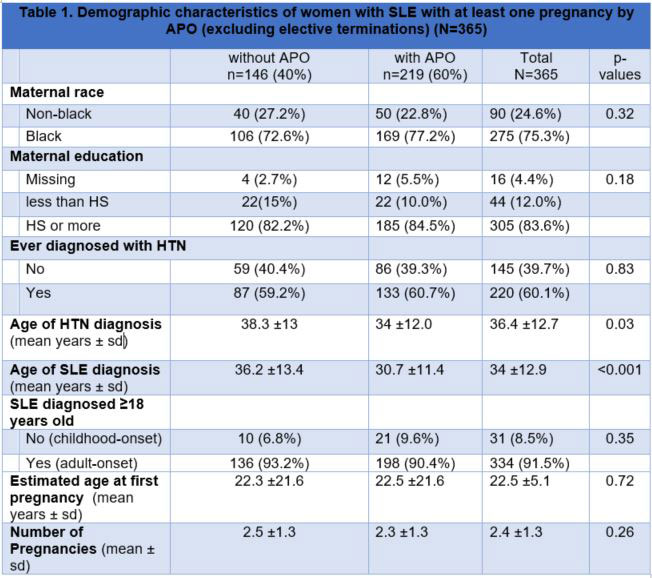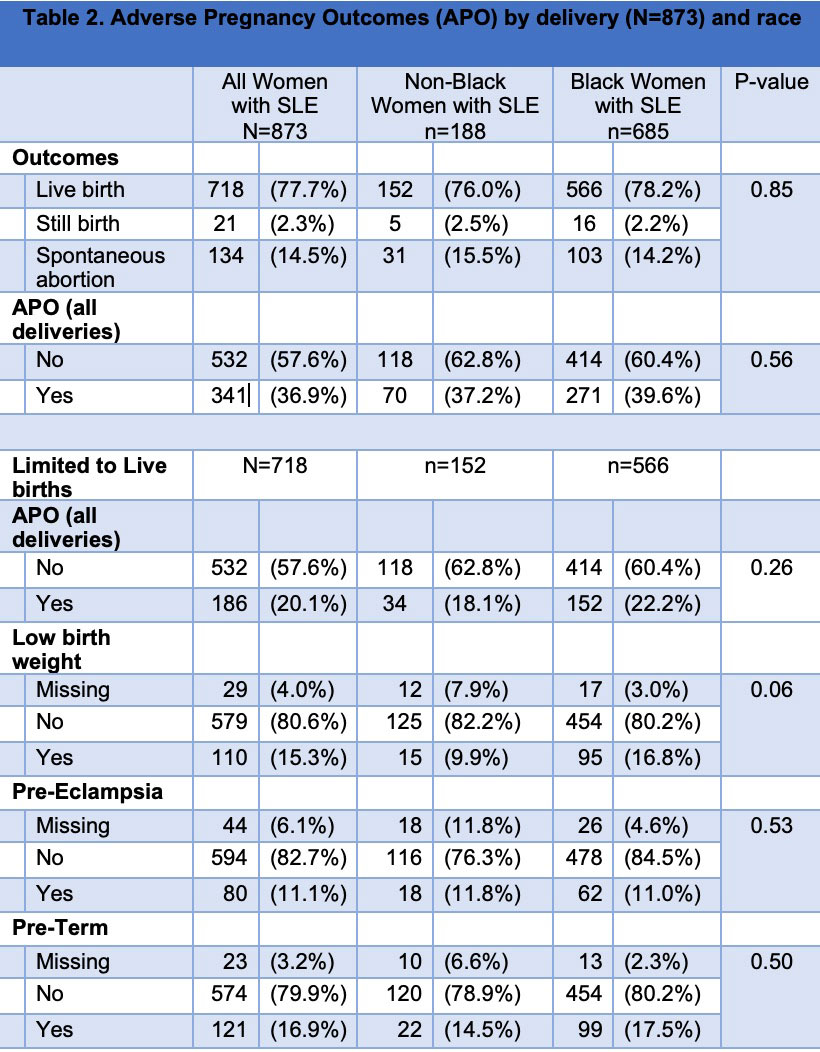Session Information
Date: Monday, November 14, 2022
Title: SLE – Diagnosis, Manifestations, and Outcomes Poster III: Outcomes
Session Type: Poster Session D
Session Time: 1:00PM-3:00PM
Background/Purpose: Advances in medicine for women with systemic lupus erythematosus (SLE) have led to improved pregnancy outcomes, but pregnancies are still high-risk and disparities remain. Hypertension (HTN) rates are higher among women with SLE compared to non-SLE controls. The goal of our study is to examine the effect HTN has on pregnancy outcomes among women with SLE.
Methods: Women with SLE and at least one pregnancy who were enrolled in a single center longitudinal prospective registry were included. Self-reported pregnancy outcomes included live births, spontaneous abortion, pre-term birth, low birth weight, and pre-eclampsia, while elective abortions were excluded. Pregnancies were classified as 1) before SLE diagnosis or 2) during(peri)/after SLE diagnosis and as either 1) with preexisting HTN or 2) without preexisting HTN (including those with HTN diagnosed after delivery). Differences by groups were evaluated with chi-square test of homogeneity or Fishers exact test. The association of pregnancy outcomes with HTN was evaluated with logistic regression; SLE diagnosis and race were evaluated as potential confounders.
Results: The analytic cohort consisted of 873 pregnancies among 365 women with SLE (275 (75.3%) Black), of which 685 (78.5%) of the pregnancies were among Black mothers. Women without SLE and those without a known pregnancy history were excluded. Demographics and clinical characteristics are described in Table 1. Each woman had an average of 2.4 ± 1.3 pregnancies. 60.1% of the women had been diagnosed with HTN at some point in their life, 22.0% with HTN prior to their first pregnancy.
Of the 873 pregnancies, there were 718 live births, 21 still births and 134 miscarriages (Table 2). The highest proportion of overall adverse pregnancy outcomes was among mothers with HTN prior to pregnancy and SLE diagnosed at the time of pregnancy or following pregnancy. Mothers who had diagnoses of HTN and SLE prior to pregnancy had the highest number of spontaneous abortions (Figure 1).
Conclusion: Preexisting HTN in women with SLE negatively impacted their pregnancy outcomes, though complicated by race and the timing of SLE diagnosis. Our results emphasize the importance of knowing potentially modifiable risk factors like HTN and the need for earlier SLE screening / diagnosis to improve pregnancy outcomes in this population.
To cite this abstract in AMA style:
Lateef a, Bray s, Wilson D, Oates J, Kamen D. Pregnancy Outcomes Among Women with Systemic Lupus Erythematosus (SLE): Impact of Preexisting Hypertension [abstract]. Arthritis Rheumatol. 2022; 74 (suppl 9). https://acrabstracts.org/abstract/pregnancy-outcomes-among-women-with-systemic-lupus-erythematosus-sle-impact-of-preexisting-hypertension/. Accessed .« Back to ACR Convergence 2022
ACR Meeting Abstracts - https://acrabstracts.org/abstract/pregnancy-outcomes-among-women-with-systemic-lupus-erythematosus-sle-impact-of-preexisting-hypertension/



